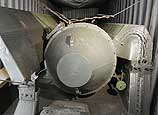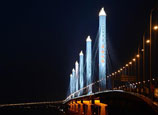
With production on Samsung’s $7-billion chip plant in Xi’an set to wrap up by the end of this year, a host of related companies are planning to set up shop there to take advantage of the opportunities it will create.
Construction is proceeding as scheduled at the plant, located in the Xi’an High-tech Industrial Development Zone in Shaanxi province, local officials said.
“We will continue our efforts to improve the service so that the Samsung facility and companies in supporting industries will be completed as scheduled,” said Yang Mingrui, deputy director of the high-tech zone’s administrative committee.
The South Korean electronics giant’s plant, the largest single foreign investment in western China, will produce nanometer chips that will be used in smartphones and tablet PCs.
It is estimated to have a monthly output of 100,000 chips and generate annual revenue worth 66 billion yuan ($10.4 billion) when it starts mass operation in February, according to local news portal cnwest.com.
Wu Gang, deputy director of the economic section at the Shaanxi Academy of Social Sciences, said the Samsung facility will make the electronics industry a pillar of the province’s economy and help optimize the industrial structure.
The Xi’an plant is Samsung’s second semiconductor manufacturing factory outside of its home country.
The first one was built in 1996 in the US city of Austin.
Boon for local market
Zhao Hongzhuan, director of the high-tech zone’s administrative committee, said the project will greatly benefit the province’s future development, noting that it will attract at least 160 supporting businesses to the zone, creating more than 10,000 jobs.
An official at South Korea’s consulate in Xi’an said, “Many South Korean companies are emailing or calling us almost every day asking about the investment environment here”.
Dongjin Semichem, a South Korean company that produces chemicals for semiconductors, has already started recruiting local employees to staff a branch in the city.
“Samsung is one of our biggest customers. And its plant in Xi’an will bring a major breakthrough in our sales performance,” a representative from the company told Xi’an-based newspaper City Economic Herald.
US company Air Products & Chemicals has also announced plans to establish a subsidiary in Xi’an to cater to the demands of Samsung and other major customers in the city.
The industrial gas producer is expected to invest more than $200 million yuan over the next few years, City Economic Herald reported.
Shaanxi Governor Lou Qinjian said, “The construction of the Samsung plant will greatly enhance the international influence and competitiveness of the province’s information industry and lay a solid foundation for building a world-leading information cluster.”
Official statistics show that the city has more than 2,600 electronics enterprises.
They include semiconductor designers Intel and Xigu Microelectronics as well as semiconductor manufacturer Crystal Growing Technology and testing companies such as Micron.
Samsung’s arrival will make the chain more complete, paving the way for Xi’an to realize its dream of becoming a major semiconductor industrial base in China, said local officials.
The Xi’an government aims to raise sales revenue of the IT industry to 600 billion yuan by 2020.
Hao Yue, a professor at Xidian University, said he is confident about the goal.
“Xi’an will develop into a city famous for its IT industry by then,” Hao said.
Attracting talents
Zhao said the South Korean giant will also help cultivate personnel for the city’s IT industry.
“More than 70 percent of Samsung’s engineers will be hired locally. This would help us produce more technicians,” Zhao said.
Gao Yong, president of Xi’an Polytechnic University, echoed Zhao.
He said that by providing internships to local students, Samsung will also help universities and colleges train more innovative students, noting that it matters a lot in this rapidly developing technology-intensive industry.
Xi’an has more than 80 universities and colleges, the most after Beijing and Shanghai.
Each year it turns out more than 17,000 postgraduates in IT-related majors, said Zhao.
The high-tech zone’s administrative committee has organized job fairs specifically for Samsung and such supporting businesses as Dongjin Semichem.
In addition to recruitment campaigns in Xi’an, the committee has sent people to scout talent in Beijing and Tianjin, according to Xi’an Evening News.
With its help, Samsung and supporting businesses have hired more than 1,000 professionals, some of whom have been sent to South Korea for training, the report said.
Samsung’s project is also expected to prompt the government to step up efforts to improve local infrastructure, said government officials.
“When the plant is finished, some 10,000 South Koreans will come and live in Xi’an,” said Fang Weifeng, director of the Shannxi provincial development and reform commission.
To prepare for this influx of foreigners, the Xi’an government will try its best to make their lives easier and enjoyable and to provide good schools for their children, Governor Lou said.
This will help give momentum to the city, which has set a goal of becoming an international metropolis by 2020, Lou said.
















 2nd cross-sea bridge spanning across Hangzhou Bay to open
2nd cross-sea bridge spanning across Hangzhou Bay to open


![]()
